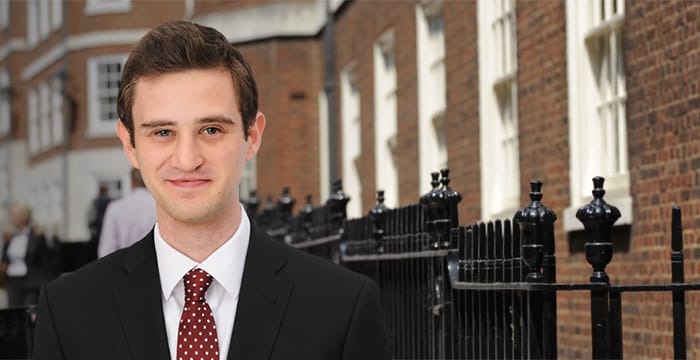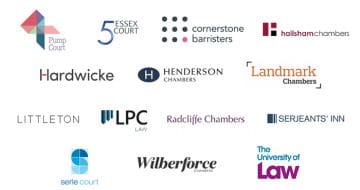Ahead of Legal Cheek’s ‘How to make it as a barrister’ event in London tomorrow, Henderson Chambers’ Harrison Denner shares his top tips

“I don’t want to put anyone off but it’s a tiring, frustrating, debilitating process that only gets better at the very end — then it is the best day of your life,” says barrister Harrison Denner, of London commercial set Henderson Chambers.
He’s talking about pupillage applications, of course — not the year-long training itself but the famously arduous process that all rookie barristers must endure, of actually persuading chambers to take you on as a pupil in the first place.
“A lot of people spend years applying for pupillage. I made 40-50 applications in total over two years. Each one has to be specific to those chambers so it is tiring — but it is worth it.” Denner, an Oxford University graduate in jurisprudence, completed an LL.M. at University College London before his Bar Professional Training Course (BPTC).
He wasn’t offered pupillage the first time round so “had a year to kill”, which he spent in what proved to be the very valuable experience of working as a paralegal at US firm Simpson Thacher’s London office. For the uninitiated, Simpson Thacher is a top US firm (and pays among the highest salaries in London to its newly qualified lawyers). The areas of law — mergers and acquisitions, capital markets deals and IPOs — may have been at odds with Denner’s future practice area of group actions and product liability but the experience of working in a law firm is always relevant to the bar as it provides an insight into the way clients operate. He says:
“It gave me something to talk about at interview and also helped me to develop soft skills in a professional environment. The job involved long hours, working into the night fairly often, there were lulls but these would be followed by extended periods of working — much like life as a junior barrister at chambers.”
These days, Denner does mainly defendant work in product liability — Henderson Chambers is widely regarded as the leading set on product liability in the country. Examples of his recent cases include acting for a pharmaceutical company alleged to have supplied a defective drug and working in a large team on behalf of a car manufacturer alleged to have fitted “prohibited defeat devices” in its cars.
So, how often does he go to court? “I have a mix of working on massive group actions, which rarely go to court and, when they do, I don’t say anything because there are more senior barristers involved,” he says. “and I also do smaller cases that I run myself, doing all the advocacy and cross-examination. I have been pretty busy with the former lately. It’s hard to say how often I go to court because it varies so much. Standing up in court is a little nerve-wracking, but the more you do the more you get used to it. You can never be certain what’s going to happen, or what the other side and the witnesses are going to say, so you have to be ready for the unexpected. I like cross-examination the most, but I also really enjoy research and building an argument, the part of advocacy that is done outside of court.”
When applying for pupillage, Denner found that each chambers had a slightly different approach. At one, he spent an entire day taking part in exercises with all the other would-be pupils who’d been called to the final interview stage. Some chambers asked specific legal questions. Others asked quite soft questions such as, “why do you want to be a barrister, and why do you want to do this particular area of law?”
Candidates will have to demonstrate that they are, academically, up to the job. At interview, “they are looking for someone who is a capable advocate, who has a certain level of eloquence, expresses themselves in a clear fashion and is able to stand their ground. That comes with experience and you don’t necessarily have that at the first pupillage interview — I got better at it with practice. A lot of these chambers are quite small, collegiate environments so it is important that you are quite personable and able to get along with people. You don’t want to come across as wooden. It’s about both preparation and being relaxed on the day. You should do all your preparation in advance and be on top of the chambers website, for example, by reading about a recent case that they were involved with. But you also have to have confidence and enough assuredness on the day to not appear cripplingly nervous.”
To find out if the chambers is the right one for you, mini-pupillages are the primary route. Denner did a mini-pupillage at Henderson in 2013, “and that was one of the main deal clinchers for me because everyone was extremely friendly and I had a great time”. When deciding which chambers to apply to, Denner suggests dividing them up by areas of law and being realistic about comparing yourself with recent junior tenants. Extra-curricular activities will also stand applicants in good stead. Denner did debates at school and university, and mooting at university. He also volunteered at the legal clinic at university and, outside of the law, plays the piano and enjoys tennis.
Harrison Denner will be speaking at Legal Cheek’s latest bar student event, ‘How to make it as a barrister’, on Wednesday evening at The University of Law’s Bloomsbury campus in London. Check out the full speaker roster here. You can apply to attend the event, which is free, now.

